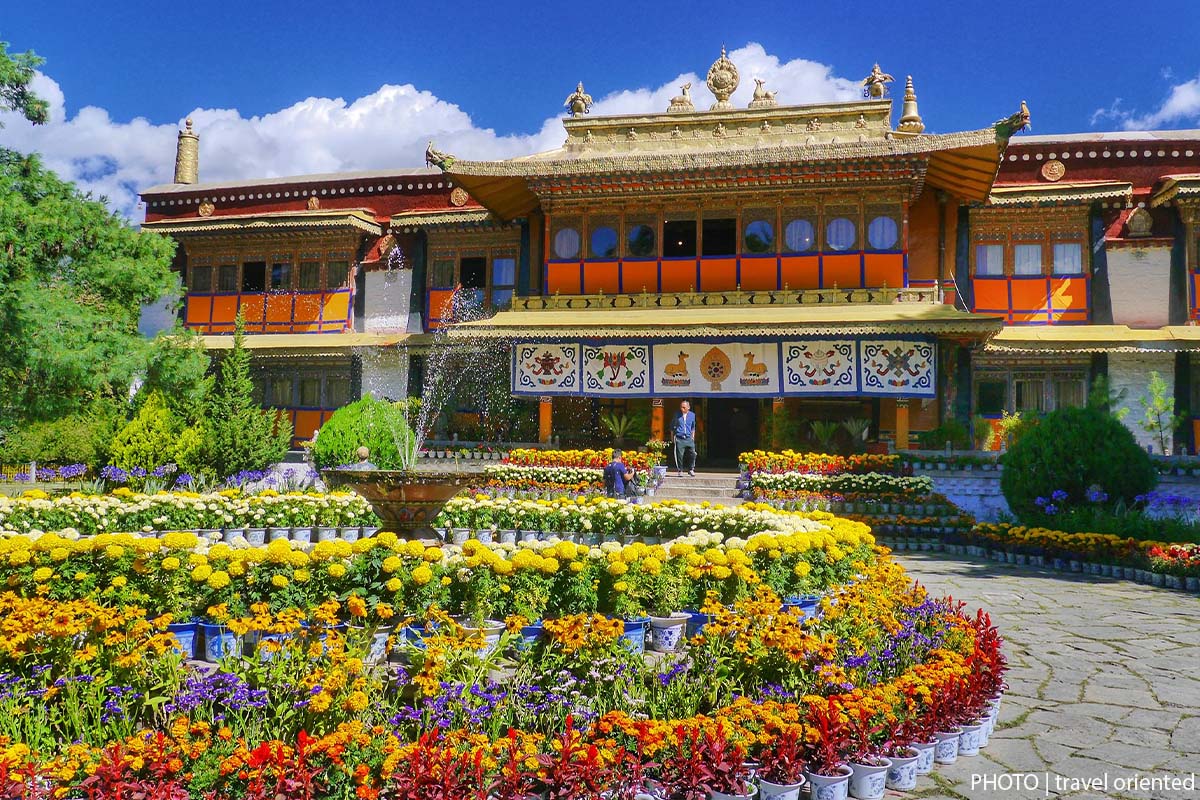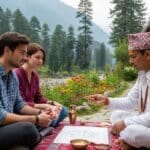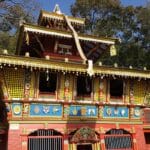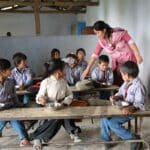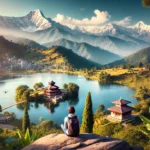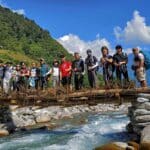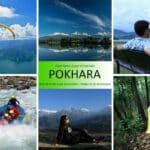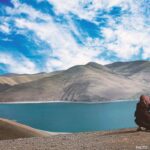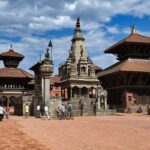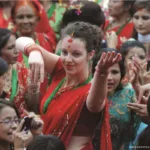There are many popular tourist destinations in Lhasa for tourists to explore. Cultural and historical sites include the incredible Potala Palace, Jokhang Temple, Barkhor Street, Drepung, Sera and Ganden Monasteries. The most famous tourist sites of Lhasa are listed below:
POTALA PALACE
Located in Lhasa, Potala Palace is one of the oldest and most iconic landmarks of Tibet dating from 7th century AD. The palace was built by King Srongtsan Gampo and named after bodhisattva Avalokitesvara. Since 17th century the palace was used as a winter residence by Dalai Lama.
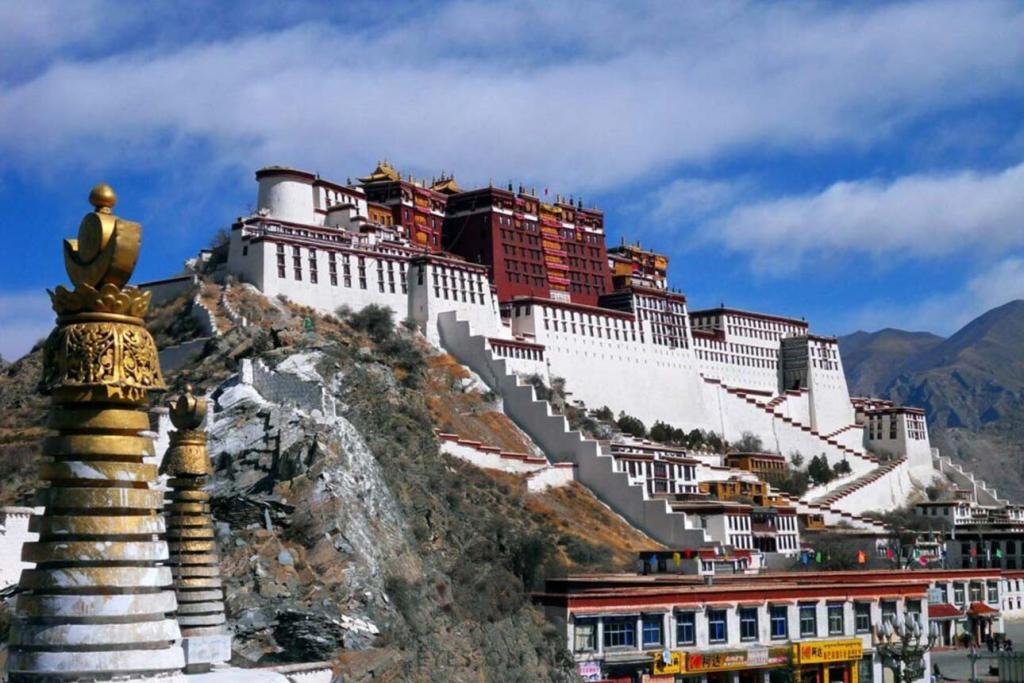
The palace has incredible 1000 rooms, 10,000 shrines, 100,000 volumes of scriptures and about 200,000 statues of several Buddhas and bodhisattvas. The palace now is a world heritage site.
FACT AND TOURIST INFO ABOUT POTALA PALACE
| Location | 2km west of Jokhang Temple. 35 Beijing Middle Rd, Chengguan District, Lhasa. |
| Altitude | 3,750 m (12,300 ft) |
| Ticket Price | RMB100/Pax | From Nov 01 to April 30 RMB 200/Pax | From May 1 to Oct 31 Children below 1.2m free |
| Opening Hours | 09:30 – 15:00 |
| Travel time | 1 hour (Suggested) |
| Builder | Songtsen Gampo in 637 AD | 5th Dalai Lama in 7th century |
| Famous for | UNESCO world heritage Site; landmark of Tibet; winter palace of Dalai Lama |
| Note | Photography in the Potala Palace is strictly prohibited |
SERA MONASTERY
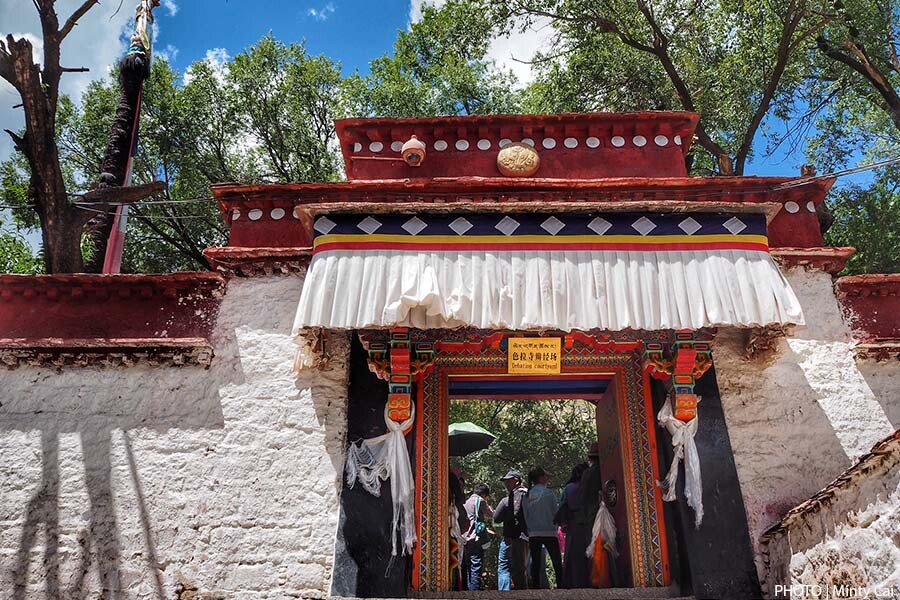
The highly sacred Sera Monastery was built in 1419 and serves as a center of Gelugpa Buddhist sect. Here travelers can observe hundreds of monks chanting Buddhist scriptures or engaging in religious debates. The monastery has hermitages, nunneries, assembly halls, library, impressive painting and statues of Buddhas along with a large horticultural garden.
The monastery is situated in Lhasa near Pubuchok Mountains and draws thousands of visitors and pilgrims. Sera Bengqin Festival is one of the most important annual events of the monastery.
FACT AND TOURIST INFO ABOUT SERA MONASTERY
| Location | 6 km north of Jokhang Temple, 20 minutes’ drive from Lhasa center. |
| Altitude | 3,700 m (12,139 ft.) |
| Founded by | Jamchen Chöjé Shakya Yeshe (1354-1435) |
| Opening Hours | 09:00 – 16:00 | All year round |
| Ticket Price | USD 50/Pax | From April to October | High season USD 25/Pax | From October to April | Low season |
| Travel time | 2 hours (Suggested) |
| Famous for | Monks debating, Thanga unveiling and Bengqin festival. One of Lhasa’s Great Three Gelugpa Monasteries |
BARKHOR STREET | POPULAR TOURIST DESTINATIONS IN LHASA
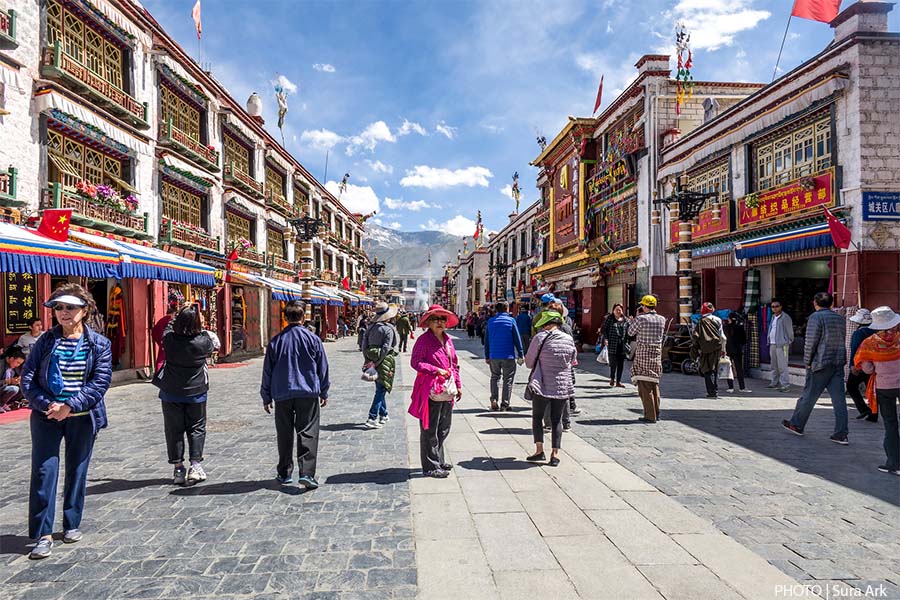
Barkhor street is the oldest street market in Lhasa, lying adjacent to Jokhang Temple. The sight, smell and sound of the Barkhor street can make you nostalgic about the mystical history of Tibet. It is visited by hundreds of Tibetans spinning prayer wheels in their hands and chanting Buddhist mantras. You will find restaurants, memorial hall, handicraft shops, antique stores and peddlers along Barkhor street.
FACT AND TOURIST INFO ABOUT BARKHOR STREET
| Location | Chengguan District, Lhasa. 35 backstreets around Jokhang Temple |
| Altitude | 3,650 m (11,975 ft) |
| Opening Hours | All day |
| Ticket Price | Free |
| Travel time | N/A |
| Founder | Songtsen Gampo (from 639 to 647 AD) |
| Famous for | Holy place, oldest street in Lhasa and the most famous bazaar and souvenir paradise in Tibet |
JOKHANG TEMPLE
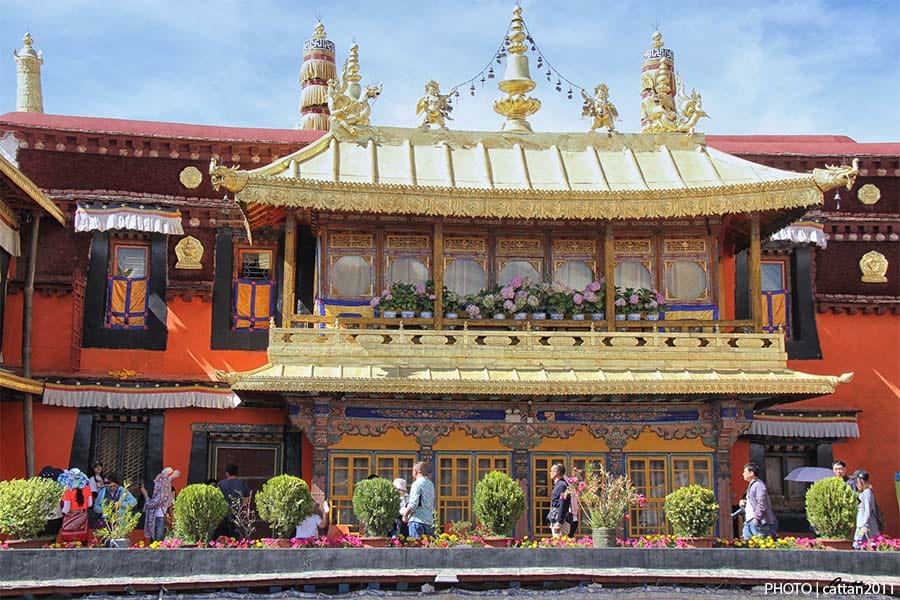
Jokhang Temple has been in existence in Lhasa since the 7th century. Located in front of Barkhor street, the temple is believed to be constructed by Tibetan King Songtsan Gampo for his Nepali and Chinese brides. The temple uniquely features the amalgamation of Chinese, Indian and Nepalese architecture. Jokhang Temple preserves the statute of Jowo Shakyamuni Buddha, hundreds of thangkas and sutras.
FACT AND TOURIST INFO ABOUT JOKHANG TEMPLE
| Location | Barkhor Street, Chengguan District, Lhasa |
| Altitude | 3,650 m (11,975 ft) |
| Opening Hours | 09:00 – 18:00 | All year round 07.00-11.00 For pilgrimage |
| Ticket Price | RMB 85/Pax |
| Travel time | 2 hours (Suggested) |
| Founder | Songtsen Gampo (from 639 to 647 AD) |
| Famous for | Spiritual heart Tibetan Buddhism. The holiest Buddhist site of Tibet. An UNESCO heritage site |
| Attraction | Marvel architecture, Buddha statues and carvings and murals |
NORBULINGKA PALACE | POPULAR TOURIST DESTINATIONS IN LHASA
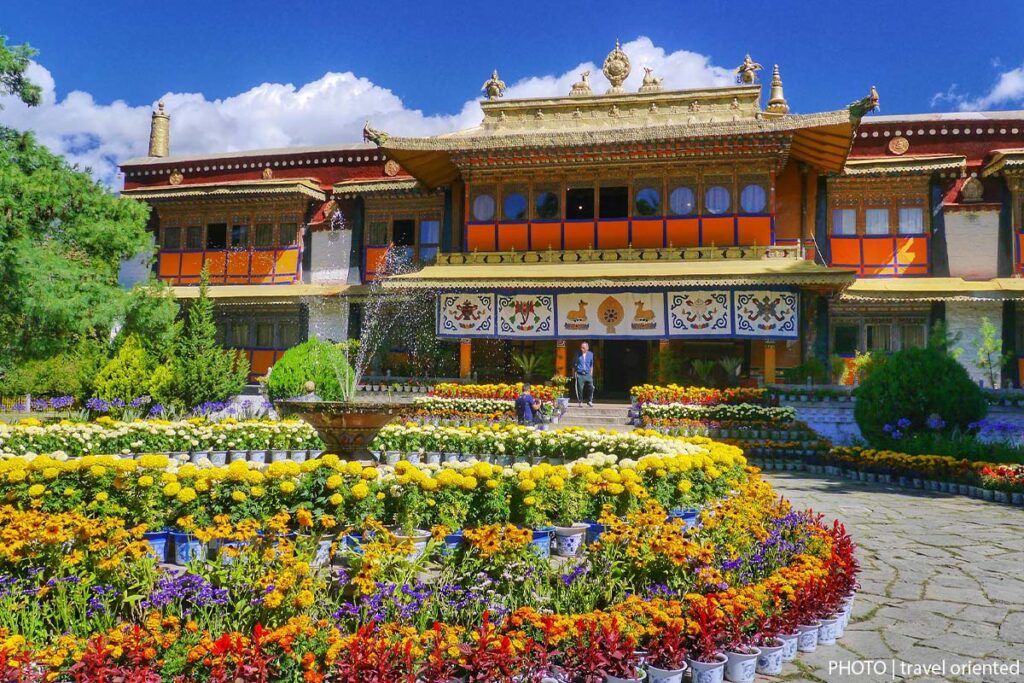
For almost 200 years, Norbulingka Palace served as the summer residence of the Dalai Lamas. Norbulingka today is a world heritage site visited by thousands of tourists and pilgrims. Among its attractions include outdoor horticultural park, Buddha murals, Ajanta frescoes, meditation and conference rooms etc. The annual Sho Dun festival in particular sees a gathering of locals and performing Lhamo or summer operas, dancing and singing.
FACT AND TOURIST INFO ABOUT NORBULINGKA
| Location | 2 kilometers west of the Potala Palace |
| Altitude | 3,650 m (11,975 ft) |
| Opening Hours | 09.00 – 17.30 | All year round |
| Ticket Price | RMB 80/Pax |
| Travel time | 2 hours (Suggested) |
| Built | 1755AD |
| Famous for | Garden of Tibet. Summer palace of Dalai Lama |
PABONKA HERMITAGE
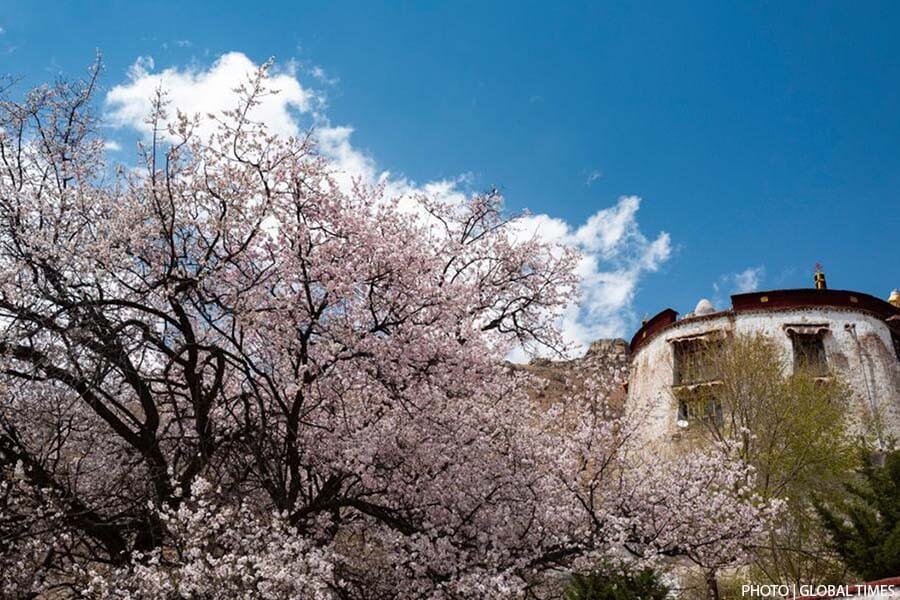
Pabonka Hermitage rests on lap of Mt. Parasol commanding beautiful view of Lhasa. It was built in 7th century by Songtsan Gampo featuring uniquely Tibetan architecture such as a gradual staircase. It is believed that Padmasambhava (Rimpoche) have lived in Pabonka during his visit to Tibet. Losar festival is hosted by the Hermitage every year in honor of Avalokitesvara.
FACT AND TOURIST INFO ABOUT PABONKA HERMITAGE
| Location | Mount Parasol, Lhasa Prefecture, Tibet, China | 8KM from Lhasa |
| Altitude | 3,650 m (11,975 ft) |
| Opening Hours | All day long | All year round |
| Ticket Price | RMB 50/Pax |
| Travel time | 2 hours (Suggested) |
| Founder | 7th century Tibetan King, Songtsen Gampo |
| Famous for | Nature and meditation |
DREPUNG MONASTERY | POPULAR TOURIST DESTINATIONS IN LHASA
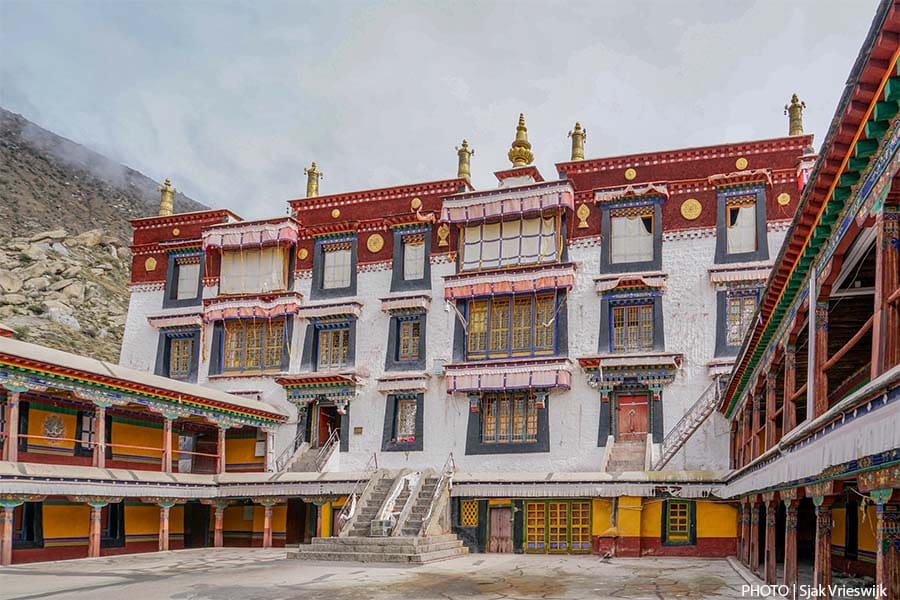
Built in 1416 by Jamyang Choge Tashi Palden, Drepung Monastery is located on Mt. Gambo Utse in Lhasa. Thousands of monks take up residence in the monastery to learn and practice Tibetan Buddhism. Visitors can witness Buddhist monks taking part in religious debates, a unique even in itself. The annual Shoton Festival is held here. The monastery contains Ganden Palace, Coqen Hall, Four Great Dratsangs and a great collection artifacts, scriptures and Thangkas.
FACT AND TOURIST INFO ABOUT DREPUNG MONASTERY
| Location | Chengguan District, Lhasa; or five kilometers from the western suburb of Lhasa |
| Altitude | 3,800 m (12,000 ft) |
| Founder | Jamyang Choge Tashi Palden (1416) |
| Opening Hours | 09:00 – 17:00 | All year round |
| Ticket Price | RMB 60 |
| Travel time | 2 hours (Suggested) |
| Famous for | One of the Great Three Holy Monasteries of Lhasa and the largest Buddhist monastery in Tibet |
GANDEN MONASTERY
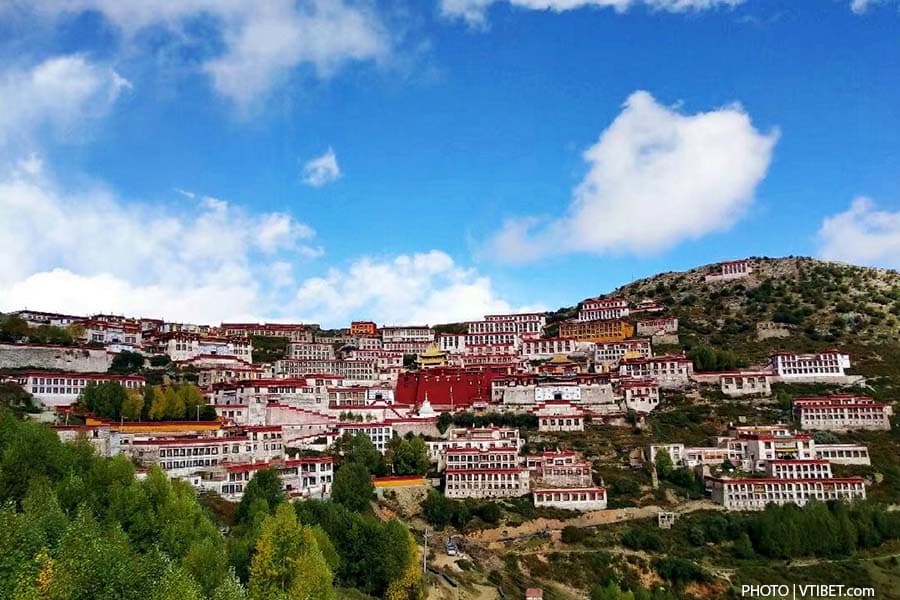
Ganden Monastery was built by Je Tsongkhapa in 1409 as the first monastery to practice Gelugpa tradition of Tibetan Buddhism. The monastery is built on Wangbori Mountain overlooking the entire valley of Lhasa. The annual Ganden Thangka Unveiling Festival and Ganden Ngachen Chenmo Festival are celebrated in the monastery.
FACT AND TOURIST INFO ABOUT GANDEN MONASTERY
| Location | Dagzê County, Lhasa, China, Around 57 kilometers to the east of Lhasa City |
| Altitude | 3,800 m (12,000 ft) |
| Founder | Je Tsongkhapa (1409) |
| Opening Hours | 09:00 – 16:00 | All year round |
| Ticket Price | RMB 50 |
| Travel time | 2 hours (Suggested) |
| Famous for | Primary monastery of the Gelug School of Tibetan Buddhism |
NAMTSO LAKE
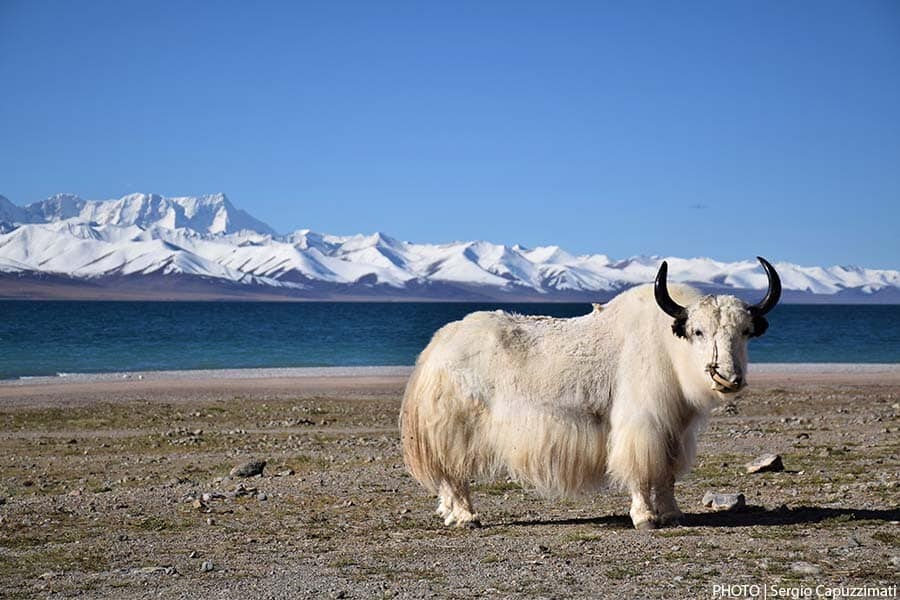
Location about 120km from Lhasa, it is one of top three holy lakes in Tibet. Formed around 43 million years ago, Namtso Lake is a saltwater body situated in Tibet at an elevation of 4718m. Namtso in Tibetan language means ‘Heaven Lake’ and is yet another holy lake worthy of pilgrimage. The lake is surrounded by Nyainqêntanglha mountain range on one side, a high Laken pass (5186m), temples and mysterious cave hermitages.
FACT AND TOURIST INFO ABOUT NAMTSO LAKE
| Location | Northwest of Damxung County, Lhasa Prefecture, Tibet |
| Altitude | 4,718 meters (15,479 feet) |
| Best time | June to September |
| Ticket Price | RMB 120(May to Oct) | RMB 60(Nov to April) |
| Visiting Time | Half day (Suggested) |
| Famous for | One of top three holy lakes in Tibet and second biggest saline lake in China after Qinghai Lake |
IS IT FREE TO VISIT POPULAR TOURIST DESTINATIONS IN LHASA?
Lhasa is a popular tourist destination located in Tibet Autonomous Region, China. While there are many attractions in Lhasa that are free to visit, there are also several popular tourist destinations that require an entrance fee.
For example, the entrance fee to visit the Potala Palace, which is one of the most famous landmarks in Lhasa, is currently 200 CNY (approximately $31 USD) during the peak season (May 1 to October 31) and 100 CNY (approximately $15 USD) during the low season (November 1 to April 30). Similarly, the entrance fee to visit Jokhang Temple, another popular attraction in Lhasa, is currently 85 CNY (approximately $13 USD) during the peak season and 60 CNY (approximately $9 USD) during the low season.
It’s important to note that entrance fees may change, so it’s best to check with the specific attraction for the most up-to-date information.
LIST OF ENTRANCE FEE FOR POPULAR TOURIST DESTINATIONS IN LHASA DURING THE SIGHTSEEING TOUR
Here are some current entrance fees for popular tourist attractions in Lhasa, Tibet Autonomous Region, China:
| ATTRACTIONS | ENTRANCE FEE |
| Potala Palace | 200 CNY (approximately $31 USD) during peak season (May 1 – Oct 31) and 100 CNY (approximately $15 USD) during low season (November 1 to April 30). |
| Jokhang Temple | 85 CNY (approximately $13 USD) during peak season and 60 CNY (approximately $9 USD) during low season. |
| Norbulingka Palace | 60 CNY (approximately $9 USD) during peak season and 40 CNY (approximately $6 USD) during low season. |
| Sera Monastery | 60 CNY (approximately $9 USD) during peak season and 40 CNY (approximately $6 USD) during low season. |
| Drepung Monastery | 60 CNY (approximately $9 USD) during peak season and 40 CNY (approximately $6 USD) during low season. |
| Tibet Museum | Free admission. |
| Barkhor Street | Free admission, but some shops and vendors may require payment for their goods. |
| Ganden Monastery | RMB 50 |
| Namtso lake | RMB 120(May to Oct) | RMB 60(Nov to April) |
| Pabonka Hermitage | RMB 50/Pax |
Please note that entrance fees are subject to change, so it’s best to check with each attraction for the most up-to-date information.
Read more about Tibet
THE MOST POPULAR TOURIST ATTRACTIONS IN TIBET
Lhasa is open for tourists, but not from every entrance. If you’re coming from mainland China, you must have a Tibet permit to go to Lhasa. But if you’re flying from Nepal, that’s not allowed yet. However, group tours by land from Nepal are okay. Ask your travel agent or check Chinese government or Tibet Travel Bureau news for the latest rules.
The best time to visit Lhasa is during its warmer months, from May to September. These months offer milder temperatures, clear skies, and accessibility to higher regions. Winter, from December to February, can be extremely cold. Plan your visit in the warmer season to enjoy the landscapes and cultural experiences comfortably.
There are many exciting destinations to visit in Lhasa. However, not all of them are manageable in a short period, and some places are not open to tourism. Below are some famous destinations that tourists must not miss if they are planning to visit Lhasa.
Potala Palace: Explore the grand residence of the Dalai Lama.
Jokhang Temple: Visit Tibet’s holiest temple in the heart of Lhasa.
Barkhor Street: Stroll through the bustling market surrounding Jokhang Temple.
Norbulingka Palace: Discover the summer retreat of the Dalai Lama.
Sera Monastery: Witness lively monk debates.
Drepung Monastery: Explore one of the world’s largest monastic institutions.
The Tibet Museum: Learn about Tibet’s rich cultural heritage.
Tourists are not allowed to travel independently in Tibet (Lhasa). Tourists need to engage a travel agency to obtain a Tibet travel permit with a pre-planned itinerary. Tourists must have a fully guided travel plan. They have the option to choose either a group joining tour or a private tour, but regardless of the option chosen, they must travel with a guide.
We’ll help you get the travel permit for your Tibet trip 20 days before. Please send a clear photo of your passport page with the picture and a copy of your Chinese visa if you are planning to enter Tibet from the mainland. If you are planning to visit Tibet from Nepal, you need a Tibet permit first to be eligible to apply for a Chinese visa in Nepal. Please send us the following information and documents to apply for a Tibet permit:
Full name
Gender
Date of Birth
Occupation
Passport number
Nationality
Make sure the above information matches what’s in your passport
Yes, all visitors traveling in Tibet and China require a valid Chinese visa.
No, Singaporean citizens do not need a Chinese visa. However, they still require a Tibet travel permit, which the travel agency can arrange for them.
Yes, US citizens need to apply for a Chinese visa either in the United States or at one of the Chinese Consulates worldwide.


